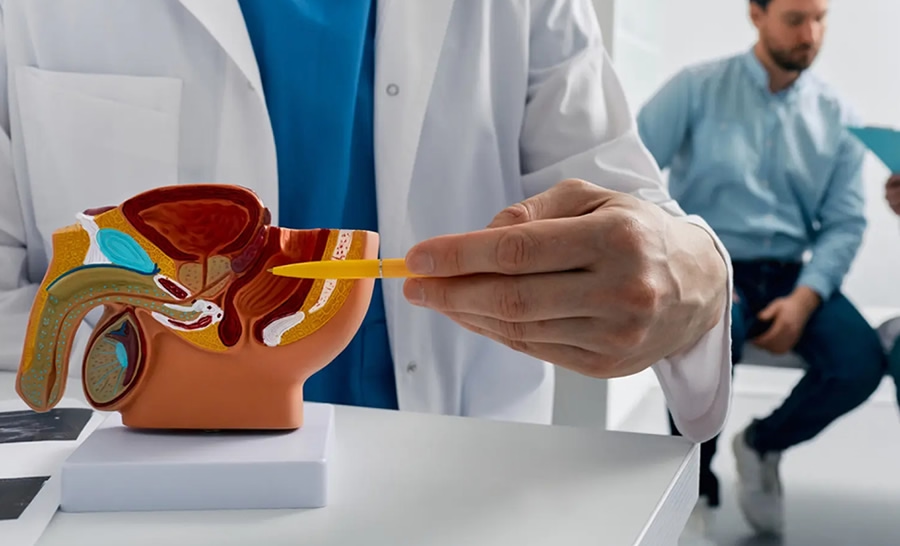By Dr. David Samadi
A man's urological health should always be a priority. When urological health is good, life is good. However, symptoms of certain urological conditions affecting men should be addressed by a urologist as soon as possible to prevent future serious medical complications.
To understand what specific urological diseases affect men, here is a list of four conditions that every man should be aware of:
1. Problems with urination.
The ability to urinate without problems is generally a given for most men. However, there are three urinary problems that men should pay attention to: painful urination, difficulty or frequency in urinating, and seeing blood in the urine.
Numerous conditions can cause painful urination. For example, a bacterial infection or sexually transmitted diseases such as genital herpes or chlamydia, or even prostate cancer, are all possible causes of painful urination. Whatever the cause, men with painful urination should see their doctor for an accurate diagnosis and treatment plan.
Men who have difficulty urinating or more noticeable urinary frequency are likely suffering from an enlarged prostate, also known as benign prostatic hyperplasia. Most men over the age of 50 will likely experience these symptoms. However, once they do, seeing a urologist to diagnose symptoms and receive treatment advice can provide relief from these bothersome problems.
Seeing blood in your urine should always be seen by a doctor. This symptom should not be ignored, as it may indicate bladder or kidney cancer. Once a doctor takes a urine sample to accurately diagnose whether it is hematuria (blood in the urine), it is time to find out why. Medical tests such as a CT scan, X-ray, or cystoscopy can help accurately diagnose the problem.
2. Kidney abnormalities.
The main kidney problems that can affect men are kidney stones, chronic kidney disease, or problems with irregularities of the ureters or urethra. Therefore, scheduling a visit with a urologist or nephrologist is crucial, as both specialties understand the general functioning of the kidneys and urinary tract.
3. Penis performance problems.
Surprisingly, the penis can have many problems during a man's lifetime. The most common problem experienced by men is erectile dysfunction, or ED. The best doctor to treat this condition is a urologist, who can recommend medications and lifestyle changes to improve performance. Urologists can also rule out sexually transmitted diseases that can affect the penis.
Priapism is another condition that affects the penis. This condition is a persistent and very painful erection of the penis, often caused by trauma or injury to the penis, pelvis, or perineum (the area between the base of the penis and the anus). It is imperative that any man with a prolonged and painful erection that does not go away receives emergency treatment to prevent irreversible damage to the penis.
Peyronie's disease is caused by a buildup of fibrous scar tissue along the penis, causing a noticeable curvature when the penis is erect. It can also be caused by repeated injuries to the penis during sex, sporting events, or as a result of an accident. Several effective treatment methods for treating Peyronie's disease include non-surgical therapy, such as medications, and in severe cases, surgery.
4. Prostate abnormalities.
As men get older, their prostate can start to cause problems. One is benign prostatic hyperplasia, or BPH, which is an enlargement of the prostate. This is fairly common among older men and can be treated with medications and lifestyle changes. The other major prostate problem is prostate cancer, the second leading cause of cancer among American men. Beginning at age 40, all men should have a prostate-specific antigen (PSA) test to help detect this disease. The PSA test is vital for early detection, as the earlier this cancer is detected, the higher the long-term survival rate.
Dr. David Samadi is the Director of Men’s Health and Urologic Oncology at St. Francis Hospital on Long Island. He is a renowned and successful board-certified robotic-surgical urologic oncologist in New York City, regarded as one of the leading prostate surgeons in the US, with extensive experience in prostate cancer treatment and robotic-assisted laparoscopic prostatectomy. Dr. Samadi is a medical contributor for NewsMax TV and is also the author of The Ultimate MANual, Dr. Samadi’s guide to men’s health and wellness, available online at both Amazon and Barnes & Noble. Please visit Dr. Samadi’s websites at robotic oncology and prostate cancer 911.
